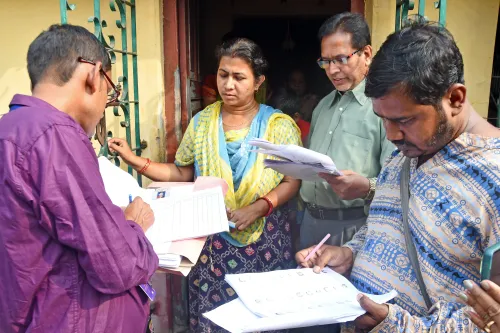Why Is LoP Gandhi Criticizing GST and Calling for Reforms?

Synopsis
Key Takeaways
- GST described as economic injustice
- Calls for people-centric tax reforms
- Over 1.8 million businesses closed since GST
- Critique of bureaucratic complexities
- Need for a cooperative federalism approach
New Delhi, July 1 (NationPress) The Leader of the Opposition (LoP) in the Lok Sabha, Rahul Gandhi, fiercely criticized the Goods and Services Tax (GST) system on Tuesday, labeling it a “mechanism of economic injustice” and calling for tax reforms that prioritize the people.
As the anniversary of GST's introduction approaches, Congress MP Gandhi emphasized that the system has been widely condemned for promoting centralized governance instead of achieving substantial tax reform.
In a post on X, LoP Gandhi expressed, “India deserves a tax framework that benefits everyone, not just the elite, allowing every Indian, from small shopkeepers to farmers, to partake in our nation's advancement.”
His comments were part of a comprehensive critique of GST, which he argues has fallen short of its foundational goals.
Gandhi pointed out that the GST—initially touted as a straightforward and beneficial tax—has devolved into a complicated five-slab system that has undergone more than 900 amendments.
He contended that this structure favors large corporations adept at maneuvering through its bureaucratic intricacies, while imposing significant compliance burdens on small traders, MSMEs, and everyday citizens.
LoP Gandhi characterized the tax framework as a “compliance nightmare,” highlighting instances where items like caramel popcorn and cream buns have been ensnared by its intricate tax system.
For smaller businesses, which he referred to as the backbone of India’s economy, the tax has become a serious existential threat due to limited financial and administrative capabilities.
Rahul Gandhi reiterated that the GST was originally conceived by the UPA government as a cohesive economic reform aimed at harmonizing India’s tax structure and improving market efficiency.
However, he argued that its execution under the current NDA government has deviated significantly from that vision, plagued by excessive modifications, politicized enforcement, and neglect of federal principles.
In advocating for structural change, LoP Gandhi called for a GST framework that is people-centric, business-friendly, and grounded in cooperative federalism.
His statements align with the Congress party’s overarching narrative of economic fairness and decentralization, echoing the concerns raised by opposition leaders and small business groups.
The Congress MP also emphasized the ongoing difficulties encountered by small traders in using the GST portal, which he claims has turned routine compliance into a daily struggle.
Launched under the Narendra Modi government in July 2017, GST was celebrated as a groundbreaking initiative, a 'One Nation, One Tax' aimed at unifying India’s fragmented tax system.
Referencing reports, LoP Gandhi asserted that over 1.8 million businesses have closed since the introduction of GST, attributing much of this decline to the financial strain caused by the tax structure.
LoP Gandhi further condemned the exclusion of petrol and diesel from the GST framework, arguing that it keeps input costs elevated for farmers, transporters, and consumers.
Supporters of the original vision from the UPA era now contend that the current application has strayed considerably from its intended purpose, urging for a recalibrated GST that is inclusive, equitable, and genuinely federal in nature.









